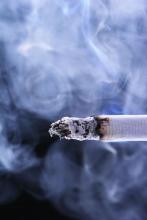Childhood exposure to parental smoking appears to greatly boost the risk of confirmed cases of rheumatoid arthritis in adult women, although the overall rate is small, a new study reports. The findings, published Aug. 18, 2021, in Arthritis & Rheumatology, follows other evidence that early second-hand smoke exposure can trigger lifelong damage to the immune system.
“We estimated that there is 75% increased risk of adult seropositive RA due to the direct impact of childhood parental smoking,” said study lead author and Brigham & Women’s Hospital epidemiologist Kazuki Yoshida, MD, ScD, referring to an adjusted analysis conducted in the study. “Passive smoking is likely harmful throughout an individual’s life course regarding rheumatoid arthritis but potentially more harmful during the childhood period.”
The researchers launched the study to fill an evidence gap, Dr. Yoshida said in an interview. “Active smoking is a well-established risk factor for RA. However, studies on passive smoking’s impact on RA are sparse, and few studies had a well-characterized cohort of participants with comprehensive data of passive smoking during life course – in utero exposure, childhood exposure, adult exposure – and chart review–adjudicated RA outcomes.”
The study authors retrospectively tracked 90,923 subjects who joined the Nurses’ Health Study II in 1989 when they were aged 25-42. At the study’s start, the average age of subjects was 34.5, 93% were White, and 98% were premenopausal. Almost two-thirds had never smoked themselves, and 65% said their parents had smoked during their childhoods.
Of the subjects, the researchers found that 532 were identified as having RA over a median follow-up period of 27.7 years. Two-thirds of those cases (n = 352) were confirmed as seropositive by clinical testing.
The study linked maternal smoking during pregnancy to confirmed RA in adulthood via a confounder-adjusted analysis (hazard ratio, 1.25; 95% confidence interval, 1.03-1.52), but the connection vanished after researchers adjusted their statistics to reflect possible influences by later exposures to smoke.
After adjustment for confounders, the study linked childhood exposure to parental smoking to a 41% in increase in risk of confirmed adulthood RA (HR, 1.41; 95% CI, 1.08-1.83). A controlled direct effect analysis boosted the excess risk to 75% (HR, 1.75; 95% CI, 1.03-2.98).
This analysis reveals that “childhood parental smoking seems to be associated with adult rheumatoid arthritis beyond what is explained by the fact that childhood passive smoking can promote personal smoking uptake, a known risk factor for rheumatoid arthritis,” Dr. Yoshida said.
The overall rate of RA in the study population – roughly 0.6% – aligns with risk levels in the general population, he said. As a result, “the absolute risk increase may not be extremely high. But the concept that early life exposure may affect immunological health later in life is important.”
Potential pathophysiological mechanisms
Why might parental smoking boost the risk of RA? Exposure to secondhand smoke may irritate the lungs and cause abnormal proteins to form, Dr. Yoshida said. “The immune system produces antibodies in an attempt to attack such abnormal proteins. This immune reaction can spread to other body sites and attack normal tissues, including the joints.”
In addition, “smoking increases the risk of infections, which could in turn increase the risk of RA. Smoking is also known to result in epigenetic changes which could trigger RA in susceptible people,” University of California, San Francisco, autoimmune disease epidemiologist Milena A. Gianfrancesco, PhD, MPH, said in an interview. She cowrote a commentary accompanying the new study.
Other studies have linked smoking exposure to autoimmune disorders. Earlier this year, researchers who tracked 79,806 French women reported at the EULAR 2021 annual meeting that they found a link between exposure to second-hand smoking during childhood or adulthood and higher rates of RA.
Dr. Yoshida and colleagues noted their study’s limitations, including the inability to track cases of RA in subjects up to the age when they entered the nurses research project. Also, only one questionnaire over the entire period of the Nurses’ Health Study II asks subjects about whether they were exposed to secondhand smoke as adults.
The study also says nothing about whether a similar risk exists for males, and the nurse subjects are overwhelmingly White.
Still, Dr. Gianfrancesco praised the study and said it relies on extensive data and strong statistical methods. “The findings are important because they drive home the importance of reducing cigarette smoke exposure to reduce risk of disease,” she said. “They highlight the need to not only focus on one’s personal smoking habits, but also other sources of secondhand smoke exposure.”
She added that children with a family history of RA or other autoimmune diseases are especially vulnerable to the effects of secondhand smoke because they may be more susceptible to developing the diseases themselves. “Rheumatologists and other health care providers should be sure to discuss the risks of smoking with their patients, as well as the risk of secondhand smoke,” she said. “And parents should keep their children away from secondhand smoke in the home or other environments in which smoke is prevalent, such as the home of another caregiver or a workplace if the child accompanies their parent to work.”
The study was funded by the National Institute of Arthritis and Musculoskeletal and Skin Diseases, the Rheumatology Research Foundation, and the National Institutes of Health. The study and commentary authors, including Dr. Yoshida and Dr. Gianfrancesco, reported having no relevant disclosures.


